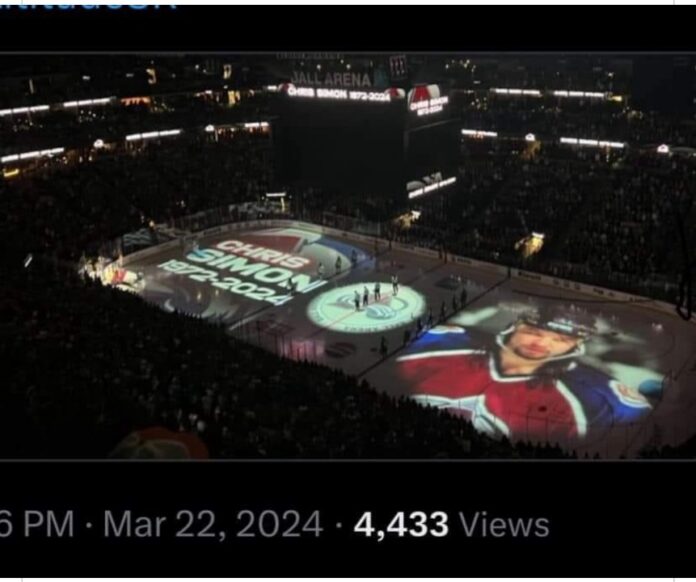M’CHIGEENG—The family of the late National Hockey League (NHL) enforcer Chris Simon, who passed away on Monday, March 18,is convinced that he suffered from chronic traumatic encephalopathy (CTE), a condition suffered by many athletes who have suffered ongoing head trauma through their careers.
Derek Debassige, of Manitoulin Physio in M’Chigeeng, has a concussion clinic as part of Manitoulin Physio’s practice and has studied CTE and its effects on athletes.
“I think these days we have different protocols in place and are much more robust in terms of new education protocols such as return to play guidelines, players who get hit in the head or suffer concussions still suffer brain injuries,” Mr. Debassige said. “It is very important for one to give themselves and their brain the time to recover from a concussion or serious head injury.”
The Expositor contacted Mr. Debassige after the announcement last week that Mr. Simon passed away from suicide, his family says as a result of mental health issues caused by CTE. The retired NHLer was from Wawa but has strong familial ties to Wiikwemkoong Unceded Territory.
Mr. Debassige did not know Mr. Simon personally but had seen him play hockey. “I understand his death involved CTE related mental health issues. I don’t know the extent of the injuries he suffered over the course of his career. I know he was a heck of a player, but he was also known as an enforcer.”
“When it comes to CTE, over time a brain is affected by repeated head injuries, hits to the head and concussion,” said Mr. Debassige. “Over time, before an athlete recovers from injuries and concussions, they get back into action and suffer another. It is one thing to have a concussion, but we hear a lot of cases of athletes who have had repeated cases. The brain doesn’t have the time to recover. You just can’t keep stretching the neuro structure before you are facing serious issues.”
“The head and body need time to full recover from an incident involving injuries,” said Mr. Debassige. “We have all heard of the dramatic number of cases of enforcers in hockey who are suffering from CTE.”
“Look for instance at a centre in football—two hits to the head in a practice and that can be a career for that player,” said Mr. Debassige.
“In years past players had to deal with the same issues but the science was not there that shows how serious an injury to their head has been,” said Mr. Debassige. “Repeated injuries to the head can have dramatic effects on mental health.” Anyone who has suffered a head/brain injury needs to give themselves time to recover and for evaluation to take place.
CBC News reported March 19 that CTE is associated with repeated traumatic brain injuries, including concussions and repeated headshots. Death by suicide and drug overdose are common among athletes in CTE cases. It was noted the NHL has repeatedly disputed any links between hockey and CTE.
However, a study of former NHLers published last year showed enforcers lived significantly shorter lives than their peers, CBC News reported. Researchers at New York’s Columbia University came to that conclusion after analyzing data from 6,039 players from 1967 through the spring of 2022. The study found enforcers died on average a decade younger than comparable peers drafted at the same rank, were of similar height and weight and played the same position.
CBC News reported the researchers did not find more deaths among the NHL enforcers than in the control group. “However, being an enforcer was associated with dying approximately 10 years earlier and more frequently from suicide and drug overdose than matched controls,” the study read. Re-emphasis on player safety and improving quality of life after a hockey career should renew discussion to make fighting a game misconduct penalty in the NHL.”
Mr. Simon is the latest former NHL tough guy to die at a young age, joining the likes of Bob Probert, Derek Boogard, Wade Belak and Rick Rypien, CBC News reported. It continued to note that the differences in cause of death between the enforcers and their fellow players was striking. The 2023 study found two neurodegenerative disorder deaths, two drug overdoses, three suicides and four vehicular crashes were attributed to the 331 players identified as enforcer/fighters, compared to just one car crash death among the age-matched control group.
NHL Commissioner Gary Bettman, in a statement called Mr. Simon’s death “tragic, but refrained from directly addressing the family’s charges linking it to CTE, reported CBC News. “We extend our deepest condolences to his family and friends,” Mr. Bettman said. “On all these matters we wait to see what the medical experts tell us. Having said that, I think it’s well documented all the changes that we’ve made over the last couple of decades to make the game as safe as possible.”
Former NHL player Reggie Leach, who lives on Manitoulin, told The Expositor, “I think the NHL has to look into all of this. We have lost five or six players in the past few years involving enforcers. Even over the past couple of years we have seen cases of deaths. In my opinion there needs to be more help provided when players reach out to the NHL Players Association, coaches, team owners for support and help. They all need to step up.”





